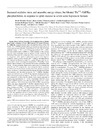Please use this identifier to cite or link to this item:
https://accedacris.ulpgc.es/jspui/handle/10553/44479
| Title: | Increased oxidative stress and anaerobic energy release, but blunted Thr(172)-AMPK alpha phosphorylation, in response to sprint exercise in severe acute hypoxia in humans | Authors: | Morales-Alamo, David Ponce-González, Jesús Gustavo Guadalupe Grau, Amelia Rodríguez-García, Lorena Santana, Alfredo Cusso, Maria Roser Guerrero, Mario Guerra, Borja Dorado, Cecilia Calbet, José A.L. |
UNESCO Clasification: | 241106 Fisiología del ejercicio | Issue Date: | 2012 | Publisher: | 8750-7587 | Project: | Integracion de Los Grupos de la Obesidad y El Síndrome Metabólico .... | Journal: | Journal of Applied Physiology | Abstract: | AMPactivated protein kinase (AMPK) is a major mediator of the exercise response and a molecular target to improve insulin sensitivity. To determine if the anaerobic component of the exercise response, which is exaggerated when sprint is performed in severe acute hypoxia, influences sprint exercise-elicited Thr172-AMPKα phosphorylation, 10 volunteers performed a single 30-s sprint (Wingate test) in normoxia and in severe acute hypoxia (inspired PO2: 75 mmHg). Vastus lateralis muscle biopsies were obtained before and immediately after 30 and 120 min postsprint. Mean power output and O2 consumption were 6% and 37%, respectively, lower in hypoxia than in normoxia. O2 deficit and muscle lactate accumulation were greater in hypoxia than in normoxia. Carbonylated skeletal muscle and plasma proteins were increased after the sprint in hypoxia. Thr172-AMPKα phosphorylation was increased by 3.1-fold 30 min after the sprint in normoxia. This effect was prevented by hypoxia. The NAD+-to-NADH.Hα ratio was reduced (by 24-fold) after the sprints, with a greater reduction in hypoxia than in normoxia (P < 0.05), concomitant with 53% lower sirtuin 1 (SIRT1) protein levels after the sprint in hypoxia (P < 0.05). This could have led to lower liver kinase B1 (LKB1) activation by SIRT1 and, hence, blunted Thr172-AMPKα phosphorylation. Ser485-AMPKα1/Ser491-AMPKα2 phosphorylation, a known negative regulating mechanism of Thr172-AMPKα phosphorylation, was increased by 60% immediately after the sprint in hypoxia, coincident with increased Thr308-Akt phosphorylation. Collectively, our results indicate that the signaling response to sprint exercise in human skeletal muscle is altered in severe acute hypoxia, which abrogated Thr172-AMPKα phosphorylation, likely due to lower LKB1 activation by SIRT1. © 2012 the American Physiological Society. | URI: | https://accedacris.ulpgc.es/handle/10553/44479 | ISSN: | 8750-7587 | DOI: | 10.1152/japplphysiol.00415.2012 | Source: | Journal Of Applied Physiology[ISSN 8750-7587],v. 113 (6), p. 917-928 |
| Appears in Collections: | Artículos |
SCOPUSTM
Citations
66
checked on Jun 8, 2025
WEB OF SCIENCETM
Citations
64
checked on Jan 25, 2026
Page view(s)
250
checked on Jan 15, 2026
Download(s)
422
checked on Jan 15, 2026
Google ScholarTM
Check
Altmetric
Share
Export metadata
Items in accedaCRIS are protected by copyright, with all rights reserved, unless otherwise indicated.
